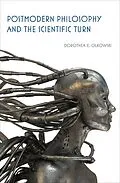A groundbreaking, interdisciplinary approach to the study of consciousness: "Beautifully written, engaging throughout, and captivating" (Claire Colebrook, The Pennsylvania State University).
What can come of a scientific engagement with postmodern philosophy? Some scientists have claimed that the social sciences and humanities have nothing to contribute, except perhaps peripherally, to their research. Dorothea E. Olkowski shows that mathematics itself-the historic link between science and philosophy-plays a fundamental role in the development of the worldviews that drive both fields.
Focusing on language, its usage and expression of worldview, she develops a phenomenological account of human thought and action to explicate the role of philosophy in the sciences. Olkowski proposes a model of phenomenology, both scientific and philosophical, that helps make sense of reality and composes an ethics for dealing with unpredictability in our world.
Vorwort
Common ground between the physical sciences and philosophy
Autorentext
Dorothea E. Olkowski is Professor of Philosophy at the University of Colorado, Colorado Springs and Director of the Cognitive Studies Minor. She is author of Gilles Deleuze and the Ruin of Representation and Resistance, Flight, Creation: Feminist Enactments of French Philosophy and editor (with Christina Schües and Helen A. Fielding) of Time in Feminist Phenomenology (IUP, 2011).
Klappentext
What can come of a scientific engagement with postmodern philosophy? Some scientists have claimed that the social sciences and humanities have nothing to contribute, except perhaps peripherally, to their research. Dorothea E. Olkowski shows that the historic link between science and philosophy, mathematics itself, plays a fundamental role in the development of the worldviews that drive both fields. Focusing on language, its expression of worldview and usage, she develops a phenomenological account of human thought and action to explicate the role of philosophy in the sciences. Olkowski proposes a model of phenomenology, both scientific and philosophical, that helps make sense of reality and composes an ethics for dealing with unpredictability in our world.
Inhalt
Preface: Postmodern Philosophy
Acknowledgements
1. Nature Calls: Scientific Worldviews and the Sokal Hoax
2. The Natural Contract and the Archimedean World View
3. Semi-Free: Thermodynamics, Probability and the New Worldview
4. Burning Man: The Influence of Non-Equilibrium Thermodynamics and the Science of Flow
5. Philosophy's Extra-scientific Messages
6. Love's Ontology: Ethics Beyond the Limits of Classical Science
Notes
Bibliography
Index
